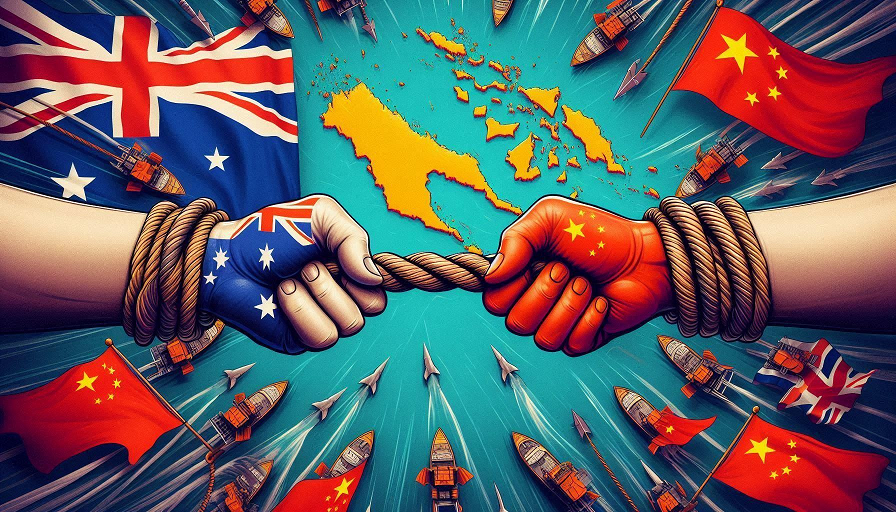
Papua New Guinea finds itself in the heart of the 21st-century multipolar battle. Surrounded by two powers, China and Australia, Papua New Guinea stands at the cusp of choosing a side, with everyone trying to court it. Repeated attempts to lure Pacific nations into agreements that compromise their security seem to be China’s gradual strategy to infiltrate local politics, bolstered by the presence of a limited Chinese diaspora across these nations.
Indians have a chronic problem: we fail to look at the broader world because we’re so entertained by politics within. From the chaos in parliament to our Prime Minister’s visit to Moscow, the entertainment of our internal politics rivals that of a soap opera. However, to develop into the global superpower we aspire to be, we must expand our view beyond self-interest and strive to understand the needs of other nations before establishing our interests.
This realization struck me during the onset of the WCT20 as I watched the qualifying matches. The enthusiasm with which countries play, and the ambition to represent their nation on the global stage, seemed to resonate in every player. However, one particular team caught my eye the most. A country that gave West Indies a run for its money in the group stages itself! A small nation that battled giants of our cricketing era like Afghanistan and New Zealand, appearing on the scorecard as PNG. The country I’m referring to is Papua New Guinea.
At first thought, you might not know where it is, and there’s no harm in admitting that. Initially, I too guessed somewhere in South America. However, please find the map for clarity below:
Yes, Papua New Guinea finds itself nestled in the heart of the 21st-century multipolar battle. Surrounded by two powers, China and Australia (heavily supported by the USA), Papua New Guinea stands at the cusp of choosing a side, with everyone trying to court it.
It all began around April when the Chinese Foreign Minister Wang Yi visited Port Moresby for a bilateral meeting and to approve grants for disaster relief funding in PNG. While signing development contracts, Mr. Yi boldly cautioned the West against treating Pacific nations as a political playground and advocated for their freedom to express their desires. Ironically, given China’s actions just two years prior.
The Pacific has become a hotbed of alliances, ambitions, and foreign involvement. From the Spratly Islands to the Solomon Islands, China appears to slowly manoeuvre towards realizing its nine-dash line dream. However, in our discussion, the latter is more intriguing. Last July, the geopolitical community was surprised to see China aligning with the Solomon Islands, signing agreements on law enforcement and security, allowing Chinese vessels to replenish in Solomon Islands ports. The climax came two months later when China turned its focus to PNG, aiming to enhance security ties with an agreement, positioning China as the standard-bearer. The Western world seems to react defensively rather than proactively.
This repeated attempt to lure Pacific nations into agreements that compromise their security seems to be China’s gradual strategy to infiltrate local politics, bolstered by the presence of a limited Chinese diaspora across these nations. However, Australia, with its historical ties to PNG dating back to WWII, seems to be at the forefront. Australia has invested in PNG’s welfare since the war, commemorated annually on ANZAC Day with Australians and Guineans undertaking a ritualistic trek to honour their fallen soldiers. The highlight this year? Australian PM Anthony Albanese joining his PNG counterpart, Mr. James Marape, on the trek.
This symbolic trek not only signifies deep ties between Australia and PNG but also underscores PNG’s diplomatic stance. PM Marape, in a post-trek press conference, acknowledged Australia’s efforts and expressed openness to China’s involvement in PNG’s economic growth, while cautioning against shortsightedness in dealing with China.
Yet, let’s not overlook the third party involved: PNG itself. What is it about this small island nation that attracts such attention from nations awash with money and military might? But discussing such details seems redundant when the winner of this geopolitical dance appears to be neither China nor Australia, but rather James Marape himself.
In a politically unstable climate, Marape’s grip on government seemed to be slipping. Recently, a parliamentary vote of confidence highlighted his perceived ineffectiveness, citing his failure to control riots that erupted when civil servants went unpaid. The police’s disinterest in quelling the unrest, which lasted two weeks and cost the exchequer a billion kina, underscored the government’s waning authority. Shortly thereafter, a clash in tribal regions claimed over 50 lives, involving high-powered weapons and even members of parliament. The government declared a state of emergency, eventually negotiating a ceasefire after a month of conflict. All this unfolded just months before the visits of Wang Yi and Anthony Albanese.
However, peace, calm, and cooperation now prevail, bolstered by renewed trust in Marape following his handling of these visits and his alignment with Australia, reflecting the will of the people. It seems painfully ironic that Marape labelled these visits a blessing to PNG. If anything, this event exemplifies political opportunism at its peak, allowing Marape to emerge unscathed and more confident.
References:
- https://www.9dashline.com/article/a-purported-pact-chinas-quest-for-security-foothold-in-papua-newguinea#:~:text=China’s%20offer%20to%20PNG&text=In%20an%20interview%20with%20Reuters,to%20Beijing%20in%20September%202023.
- https://apnews.com/article/china-solomon-islands-security-agreement-de468190f3e0cf40c160e19ceebfedf1
- https://english.news.cn/20240420/29e4fa8552044f0b852a97e510192ff0/c.html
- https://www.internationalaffairs.org.au/australianoutlook/what-are-chinas-interests-in-papua-new-guinea/#:~:text=PNG%20lies%20just%20north%20of,operations%20in%20the%20South%20Pacific.
- https://www.abc.net.au/news/2024-04-22/papua-new-guinea-visit-from-china-albanese-hot-on-their-tail/103751446
- https://www.internationalaffairs.org.au/australianoutlook/more-instability-ahead-for-papua-new-guinea/
- https://eastasiaforum.org/2024/01/09/political-uncertainty-puts-pngs-progress-at-risk-in-2024/
